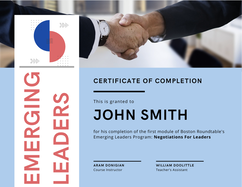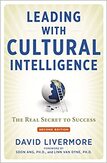Learn the Foundations of Strong Communication

Great modern thinkers from Wendy Clark to Neil Degrasse Tyson have long advocated the importance of properly conveying a message, but what exactly makes for a good communicator? One of the most important pillars is understanding the receiver of the message - the fundamental question of cultural intelligence.
Leading in today’s organizations, whether business or otherwise, requires expertise in multiple dimensions of various national, ethnic, and organizational cultures. Rather than trying to master all the details of each and every culture (though at least some of this work is necessary), this course will present the meta-cultural approach of “Cultural Intelligence Quotient” (CQ), giving a leader a framework to function effectively in any cross-cultural setting. The dimensions involved show substantive differences among many cultures that are conventionally considered similar. Multi-disciplinary academic research across 30 countries and various industries confirms that success in cross-cultural management can be measured, predicted, and learned, building a repertoire of skills that pertain to any cross-cultural situation. CQ’s relation to the Big Five model of personality traits will also be examined. The course will use case studies, ROI stats, role plays, and examples from the Dalian Wanda Group, Facebook, Google, McDonald’s, Procter and Gamble, Toyota, and other organizations.
Leading in today’s organizations, whether business or otherwise, requires expertise in multiple dimensions of various national, ethnic, and organizational cultures. Rather than trying to master all the details of each and every culture (though at least some of this work is necessary), this course will present the meta-cultural approach of “Cultural Intelligence Quotient” (CQ), giving a leader a framework to function effectively in any cross-cultural setting. The dimensions involved show substantive differences among many cultures that are conventionally considered similar. Multi-disciplinary academic research across 30 countries and various industries confirms that success in cross-cultural management can be measured, predicted, and learned, building a repertoire of skills that pertain to any cross-cultural situation. CQ’s relation to the Big Five model of personality traits will also be examined. The course will use case studies, ROI stats, role plays, and examples from the Dalian Wanda Group, Facebook, Google, McDonald’s, Procter and Gamble, Toyota, and other organizations.
Faculty Lecturer - David Miller
|
Cultural Intelligence is instructed by David Miller, a senior lecturer at Northeastern University in Boston.
David Miller has worked with international students at the University of Michigan in Ann Arbor (part time) and Georgia Tech in Atlanta (full time) in addition to Northeastern. He has taught all levels of English grammar, listening comprehension, pronunciation, reading, writing, and culture. He has developed curriculum for many customized settings. His cross-cultural linguistic expertise and deep understanding of cultural competence are readily put in application to current domestic and global relations. David has lived and worked in Germany, Spain, the Philippines, Kenya, Uganda, Mozambique, and the U.K. He and his wife have also been resident managers for 14 years of a household for international high school and university students in Boston, hosting residents from 21 countries, at 4 high schools and 13 universities/research labs. Having been an international student himself, he enjoys helping students thrive in their academic and personal goals. David holds an M.A. in Linguistics from the University of Michigan and a B.A. in Cultural Linguistics from the College of Wooster (Wooster, OH), |
2020 Class Schedule
|
The 2020 iteration of our negotiation course meets bi-weekly for one month (5 weeks total).
Classes meet Wednesdays and Fridays from 9-10 AM US Eastern Standard Time via Zoom link. Please double check local time zone differences to ensure you are attending at the correct time or refer below:
|
|
Readings and Grading
This course relies on online web assessments, group projects, and a final paper. In addition, active class participation is important to ensure that class time is well-utilized. Although the course is treated similarly to a "Pass/Fail" course, students also receive a personal evaluation. To help all students participate and contribute equally, additional material on vocabulary and language structures used in the course will be given beforehand, to prepare for the course.
|
The core text for this class is Leading With Cultural Intelligence: The Real Secret to Success by Cultural Intelligence Center president and partner David Livermore. Revolving around recent research, case studies, and statistics on the ROI of improving personal CQ, the new edition of the book details a powerful, model for becoming more adept at managing across cultures in four-steps: Drive, Knowledge, Strategy, and Action. Students will be expected to read the entire book in sections over the course of the program.
|
Advantages

Among the key teaching objectives, Emerging Leaders aims to:
- Develop strategies to improve student CQ
- Facilitate cross-cultural interactions between American and international students
- Explore the professional avenues in which CQ is an affective tool
- Give students tangible opportunities for group presentations and research paper experience
- Strengthen relevant vocabularies for professional and academic
Application
Cultural Intelligence's content pulls from material normally seen in a college course, and is therefore recommended for motivated and self-driven high school students. All interested students will submit a brief application detailing their basic information as well as why they are interested in the course. Successful applicants will be notified within 3 days of their application. The cost of this program is $499. Payment will be required after notification of acceptance.


